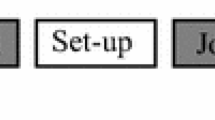Abstract
Uncertainty accompanies almost every situation in real world and it influences our decisions. In sequencing situations it may affect parameters used to determine an optimal order in the queue, and consequently the decision of whether (or not) to rearrange the queue by sharing the realized cost savings. This paper extends the analysis of one-machine sequencing situations and their related cooperative games to a setting with interval data, i.e. when the agents’ costs per unit of time and/or processing time in the system lie in intervals of real numbers obtained by forecasting their values. The question addressed here is: How to determine an optimal order (if the initial order in the queue is not so) and which approach should be used to motivate the agents to adopt the optimal order? This question is an important one that deserves attention both in theory and practice.
Similar content being viewed by others
References
Alparslan Gök SZ, Branzei R, Tijs S (2008) Cores and stable sets for interval-valued games. Preprint, 90, Institute of Applied Mathematics, METU and CentER DP, 17, Tilburg University, Center for Economic Research (revised)
Alparslan Gök SZ, Branzei R, Tijs S (2009a) Convex interval games. J Appl Math Decision Sci 342089: 14–15. doi:10.1115/2009/342089
Alparslan Gök SZ, Miquel S, Tijs S (2009b) Cooperation under interval uncertainty. Math Methods Oper Res 69: 99–109
Borm P, Hamers H, Hendrickx R (2001) Operations research games: a survey. TOP 9: 139–216
Branzei R, Branzei O, Tijs S, Alparslan Gök SZ (2010a) Cooperative interval games: a survey. Central Eur J Oper Res 18: 397–411
Branzei R, Tijs S, Alparslan Gök SZ (2010b) How to handle interval solutions for cooperative interval games. Int J Uncertain Fuzziness Knowl Based Syst 18: 123–132
Curiel I, Hamers H, Klijn F (2002) Sequencing games: a survey. In: Borm P, Peters H (eds) Chapters in game theory—In honor of Stef Tijs. Kluwer, Dordrecht, pp 27–50
Curiel I, Pederzoli G, Tijs S (1989) Sequencing games. Eur J Oper Res 40: 344–351
Moore R (1979) Methods and applications of interval analysis. SIAM Studies in Applied Mathematics, Philadelphia
Smith W (1956) Various optimizer for single-stage production. Naval Res Logist Q 3: 59–66
Author information
Authors and Affiliations
Corresponding author
Rights and permissions
About this article
Cite this article
Alparslan-Gök, S.Z., Branzei, R., Fragnelli, V. et al. Sequencing interval situations and related games. Cent Eur J Oper Res 21, 225–236 (2013). https://doi.org/10.1007/s10100-011-0226-3
Published:
Issue Date:
DOI: https://doi.org/10.1007/s10100-011-0226-3




